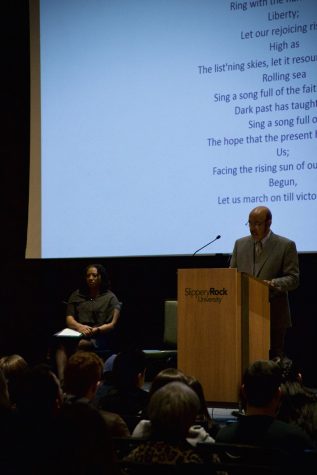Many students were unaware that a retired SRU Biology professor, Thomas Gaither, had a unique and powerful history fighting for civil rights. Gaither, who taught at Slippery Rock from 1968 to 2007, shared his story of being part of the ‘sit in’ movement, where he and other activists sat at the counter of a whites-only restaurant to protest and were put in jail, Thursday night in the Smith Student Center Ballroom.
This talk kicked off many events that will be happening this month at SRU in honor of Black History month. It was sponsored by the Diversity, Equity and Inclusion Leadership Team and the Frederick Douglass Institute.
“[Black History Month] is here to educate those who may have been ignorant to our history,” Corinne Gibson, the Diversity, Equity and Leadership Team president shared.
Gaither said the most important thing to him as an activist is non-violence. He also strongly believes in educating the youth. Gaither was president of the National Association for the Advancement of Colored People (NAACP) on his college campus.
Gaither and eight other college students from Rock Hill’s Friendship Junior College in Rock Hill, S.C., who would come to be known as The Friendship Nine planned the sit-in for January 31, 1961. Within seconds, policemen dragged them out of the restaurant and across the street to the local jail.
The nine activists had the option of paying a $100 fine or completing 30 days of hard labor. They completed the labor as part of the ‘Jail, No Bail’ movement, which stressed not giving money to the government for Jim Crow laws, which enforced racial segregation.
“As soon as we saw [the sit-in movement] on the news, there was no question that we had to take part in it as well,” Gaither said.
This event was one that led to the signing of the Civil Rights Act just three years later by President Lyndon Johnson.
“[The Civil Rights Act] set the social tone in the country so other movements could be accepted,” Gaither said.
Recently, Gaithers’ 1961 conviction was overturned by a South Carolina judge in order to “right history.”
Gaithers’ strong passion for activism led him to meet many along the way, including Dr. Martin Luther King.
“I had the pleasure of knowing Dr. King and was deeply moved. Martin Luther King was uniquely poised to speak for the movement in a way no one else could,” Gaither said.
Gaither’s influence on the Civil Rights movement remains, as well as his impact on Slippery Rock. Today, there is a $1,000 scholarship in his name for biology students.
“Some of the same issues [around in the 60s] are still around. Whatever you do, make sure you are nonviolent. Find your passion. There are lots of things to still be done,” Gaither concluded.








